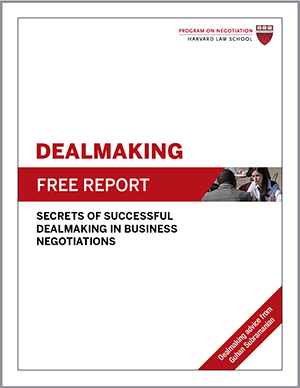
Imagine you’re competing with multiple parties to secure a coveted resource, such as your dream house, a cool invention, or a talented new hire. How might you stand out from the pack and win the prize? While negotiating its $13.4 billion acquisition of upscale grocer Whole Foods in 2017, online retailer Amazon did so in large part by demanding an exclusivity period.
In his book Dealmaking: The New Strategy of Negotiauctions (Norton, 2011), Harvard Business School and Harvard Law School professor Guhan Subramanian writes that you can succeed at cutting off the competition in an auction or negotiation-auction hybrid by negotiating for an exclusivity period.
What Is an Exclusivity Period?
In dealmaking, the most obvious method for guaranteeing that the other party will not negotiate a deal with other bidders and perhaps provoke a bidding war is an exclusivity period. During an exclusivity period, also known as a “no-talk” period, both sides agree not to negotiate an alternative deal with third parties.
Here’s how an exclusivity period played out in Amazon’s acquisition of Whole Foods. In April 2017, activist hedge fund Jana Partners revealed it had acquired a nearly 9% stake in upscale grocer Whole Foods and was seeking to shake up upper management, Business Insider reports. Whole Foods was facing pressure to prop up its slumping stock price and reverse declining profits.
Whole Foods CEO John Mackey and his team took steps to fend off the hostile investors. They arranged a meeting with Amazon to discuss a merger, engaged in talks with supermarket chain Albertsons regarding a potential merger, and met with another competitor regarding a commercial supply-chain deal.
On May 23, Amazon submitted a written offer to purchase Whole Foods for $41 per share, 17% above its $35 per share trading price. But Amazon was adamant about two conditions: utmost secrecy and an exclusivity period. If word of the talks got out or if Whole Foods wanted to auction itself off, Amazon would bow out.
On May 30, Whole Foods’ board met to discuss its options and decided to agree to Amazon’s negotiation terms. After some back and forth, Whole Foods agreed to Amazon’s “best and final” offer of $42 per share.
How an Exclusivity Period Promotes Agreement
Amazon successfully shut down its competition by making exclusivity a condition of its negotiations with Whole Foods. According to Subramanian, an exclusivity period can improve the likelihood that a buyer and seller will reach an agreement, for at least three reasons:
- A trust-building move. An exclusivity period allows parties to signal that they believe that a deal is possible, which can build the trust needed to explore joint gains.
- BATNA concessions. Typically in negotiation, one of your main goals is to improve your best alternative to a negotiated agreement, or BATNA. When you have strong alternatives to the current deal, you will likely push for more favorable terms. By contrast, when parties agree to an exclusivity period, they worsen their BATNA—and bargaining power—by eliminating their ability to pursue a better deal, at least for a set period of time. This can increase their odds of closing the deal. If parties are making roughly equivalent sacrifices in giving up their BATNAs, then agreeing to an exclusivity period should have little effect on their relative bargaining power or the outcome of the deal, according to Subramanian.
- A clear deadline. Because an exclusivity period has a specified end date, it sets a clear negotiation deadline. This deadline motivates one or both parties to present their best and final offer before the exclusivity period ends.
Executing an Exclusivity Period the Right Way
Because an exclusivity period can be costly to a seller who has many options, Subramanian offers clear deal design advice: Don’t agree to an exclusivity period until you have exhausted your negotiations with all promising buyers. When you have multiple bidders, you can play them against each other and drive up the price.
Buyers, meanwhile, may need to give the seller an incentive to agree to an exclusivity period, such as an offer that your competitors can’t match. If you bring unique value to the deal that you can demonstrate to your counterpart, such as a reputation for prestige or opportunities to reach new customers, all the better.
Accompany the request for an exclusivity period with a credible threat to walk away—and then be prepared to do so. Finally, note that your request for an exclusivity period is more likely to be effective when your target is under pressure to reach an agreement in a hurry.
Have you ever negotiated during an exclusivity period, and if so, how did it work out for you?





